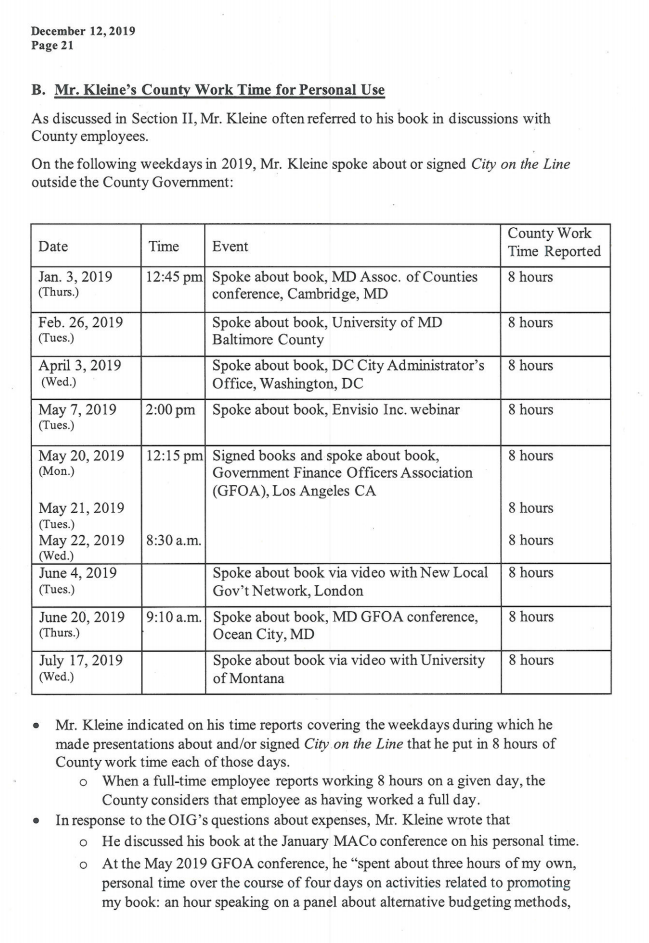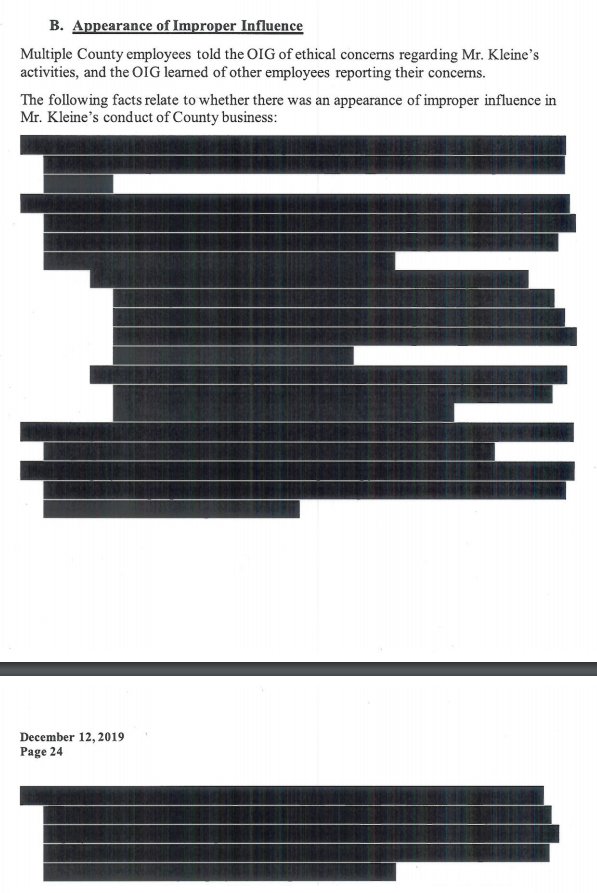By Adam Pagnucco.
You might think of Montgomery County Government as an entity that finances schools, deploys police and fire fighters, maintains roads, administers social services, operates libraries and more. Yes, it is all of those things. But under the Elrich administration, it became one more thing:
A book club.
Imagine that you write a book. You think it’s a great book. It’s all about how to run a local government. And then you get a dream job actually running a local government. And it’s not just any local government – it’s a very prestigious one, with more than 8,000 employees who will now be working for you. You think this government is doing OK, but it could do a lot better if it was run in accordance with what your book says. So what are you going to do?
Encourage as many of your employees to read that book as possible.
That is one of the biggest themes pervading the bombshell report written by the ethics commission and the inspector general (IG) about Chief Administrative Officer (CAO) Andrew Kleine, the top manager in county government. Ethics complaints made by county employees last year resulted in Kleine admitting to breaking two provisions of county ethics law over issues related to his book, City on the Line, and his participation in getting two of his private business partners county contracts.
Kleine is not the star of the report. His book is. Over and over, it’s about the book.
The IG noted many details about the promotion of Kleine’s book inside county government. Consider the following excerpts from the report.
*****
Multiple County employees reported to the IG that Mr. Kleine often spoke about his book to County employees and that they felt they needed to read it. OMB [the Office of Management and Budget] referred to City on the Line in its budget training sessions, after which County employees from various departments emailed that they needed a copy.
On December 10, 2018, Mr. Kleine retweeted a tweet from the program director of the political science program at UMBC at Shady Grove that stated, “#MoCo agency bosses are reading/having staff read incoming Chief Administrative Officer’s @awkleine’s book City on the Line. You should too. Available at Amazon for $35 http://a.co./d/hf7xUtV @UMBCpolisci @MarcElrich”
On December 18, 2018, a County Department Director emailed that City on the Line was “assigned to him as mandatory reading.” The CAO supervises County department directors and would be the person who could require certain work assignments from Department Directors.
On April 29, 2019, the Director of OMB emailed staff, “To help the office plan for outcome budgeting and the Turn the Curve initiative, we have five copies of the books City on the Line and Trying Hard is Not Good Enough. Please see me or Darlene if you want to borrow one. I also have coupons if you want to purchase your own copy of City.”
On June 6, 2019, an OMB employee emailed a telework plan that included reading City on the Line.
On July 1, 2019, the Director of OMB emailed his staff a compilation of takeaways from City on the Line.
On August 6, 2019, an OMB employee asked an OMB staff member and a Recreation Department budget specialist to draft a presentation for the Training Implementation Workgroup. “You can use City on the Line, Chapter 3… as a reference.”
A speaker note on the OMB & Training Implementation Workgroup September 2019 presentation, “Outcome Based Budgeting FY21 Operating Budget” stated that, “We can use the example – from City on the Line Pg 58/59.”
On August 14, 2019, an OMB employee emailed other staff, “As a suggestion, it may be advantageous to read the following materials to gain a better understanding of Outcome Based Budgeting and Turn the Curve thinking: City on the Line and Trying Hard is Not Good Enough.”
On August 19, 2019, a Recreation Department emailed, “Could you please order me a copy of City on the Line… we are discussing it in our work sessions and I am the only person in the group who does not have a copy. Plus we are receiving work assignments related to the information in the book.”
On August 19, 2019, a Department of Permitting Services employee emailed a request for City on the Line via 2-day shipping from Amazon and wrote, “I normally wouldn’t pay this, but we need this book to reference for outcome budgeting, which is a new way of budgeting this year.”
On August 23, 2019, a Department of Police employee emailed, “In the budget meetings I am going to they keep referring to a book ‘City on the Line.’”
*****
And so the book was integrated into the operations of county government. Employees were being encouraged to read it and some felt left in the dark if they didn’t. That means books had to be acquired and someone had to pay for them. According to the report, the county spent approximately $3,000 to buy 89 copies of Kleine’s book. Kleine earned total royalties from all purchases of $3,157 on the book through the end of 2018. Royalties paid in 2019 and 2020 are not mentioned in the IG report.

Even this guy thinks all this book stuff is getting out of hand.
Kleine also promoted the book at events outside the county government while on work time. The screen shot below from the IG’s report details how 80 hours of Kleine’s official work time – charged to taxpayers – included book promotion.

Did Kleine’s activities create an appearance of improper influence? Here is what the IG’s report had to say about that:

Redactions like the ones above are made to protect witnesses. Because Kleine is still the CAO, these witnesses presumably remain Kleine’s subordinates if they are still employed by the county.
What should we make of all this?
Throughout the report, Kleine comes across as a man who wants to be a celebrity, a public management guru, who preaches things like “Turn the Curve” to build his brand, sell books, make speeches and get consultant contracts. There’s nothing inherently wrong with that but that’s not why taxpayers are paying him $280,000 a year. We need a nuts-and-bolts operations manager in this role, someone who makes the trains run on time and works on behalf of the taxpayers with no other agenda at play.
It’s incredible that this needs to be said, but the CAO should be running county government, not converting it into a royalty-generating book club.
